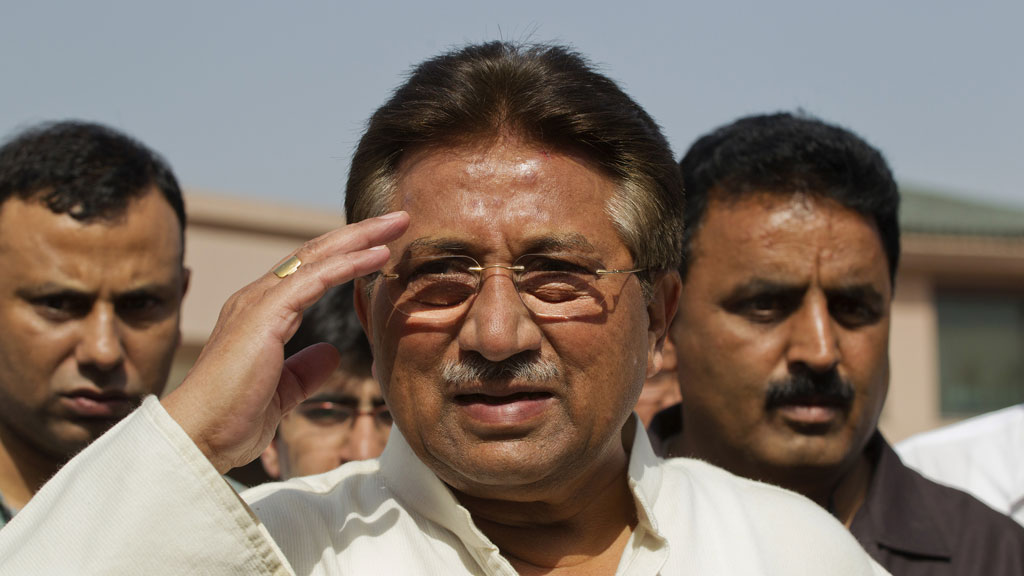Musharraf in police cusody in Pakistan
The former Pakistani president Pervez Musharraf is taken into police custody in Islamabad after fleeing a court which had ordered his detention.

Musharraf, who is attempting a political comeback in parliamentary elections after returning from self-imposed exile, had been under house arrest at his home in the Pakistani capital before he was taken away.
His spokesman Mohammed Amjad said he would spend two days on remand at police headquarters before appearing in front of a court.
Mr Amjad said police moved the former president because a senior police official had failed to issue the paperwork needed to comply with a judge’s order that he should be detained at home.
Yesterday, Musharraf left an Islamabad court in a speeding vehicle following a judge’s rejection of his bail application.
The former military ruler said on his Facebook page: “These allegations are politically motivated, and I will fight them in the trial court, where the truth will eventually prevail.”
Pervez Musharraf appeared before a court in Islamabad this morning. The judge ordered police to keep him in custody for two days, after which he would appear before an anti-terrorism court.
The case centres on his attempt to have judges placed under house arrest in 2007.
Awkward situation
The decision by the police to arrest Musharraf ends an awkward situation in which he was being protected by security forces while holed up in his house.
They are thought to have been awaiting orders from senior officials trying to figure out how to deal with the delicate situation.
Pakistan’s government has been reluctant to enter the controversy surrounding Musharraf since he returned last month, given his position as a former head of the army, which is considered the most powerful institution in the country.
I have today brought an end to the mass distraction and media frenzy generated by the unwarranted act of the… fb.me/1mGpA6xGB
— Pervez Musharraf (@P_Musharraf) April 19, 2013
His return also presents complications for the current army chief, General Ashfaq Parvez Kayani, who may have to decide whether to intervene to protect Musharraf or see him prosecuted.
If Musharraf, 69, is sent to prison, it would be the first time an army chief has been put behind bars in the country’s 65-year history.
Musharraf seized control in a coup in 1999 and spent nearly a decade in power before being forced to step down in 2008.
Return from exile
Despite legal challenges and Taliban death threats, he returned last month after four years in London and Dubai.
This week, he was disqualified from running in the 11 May election because of his actions while in power. A court has also barred him from leaving the country.
The upcoming vote is historic because it will mark the first time in Pakistan that parliament has completed its full five-year term and handed over power in democratic elections.
The country has experienced three military coups and constant political instability since it was founded in 1947.
These allegations are politically motivated, and I will fight them in the trial court, where the truth will eventually prevail. Pervez Musharraf
Thursday’s case before the Islamabad high court concerned Musharraf’s decision to dismiss senior judges, when he declared a state of emergency and suspended the constitution in 2007.
He was concerned the judges would challenge his re-election as president, citing the growing Taliban insurgency in the country as justification for the state of emergency.
Nationwide protests
Musharraf’s crackdown on the judges outraged many Pakistanis and led to a nationwide protest movement by lawyers that eventually resulted in him stepping down under threat of impeachment.
After his arrest order yesterday, Musharraf’s bodyguards hustled him out of the court, past policemen and paramilitary soldiers, and helped him into a car.
The security forces on duty at the court seemed caught off guard, and nobody appeared to try to prevent Musharraf from leaving as he pushed past them.
Given the legal fights and Taliban threats he is facing, many experts are wondering why he returned to Pakistan. Some have speculated he misjudged the level of public backing he would receive, while others suggested he was simply homesick.